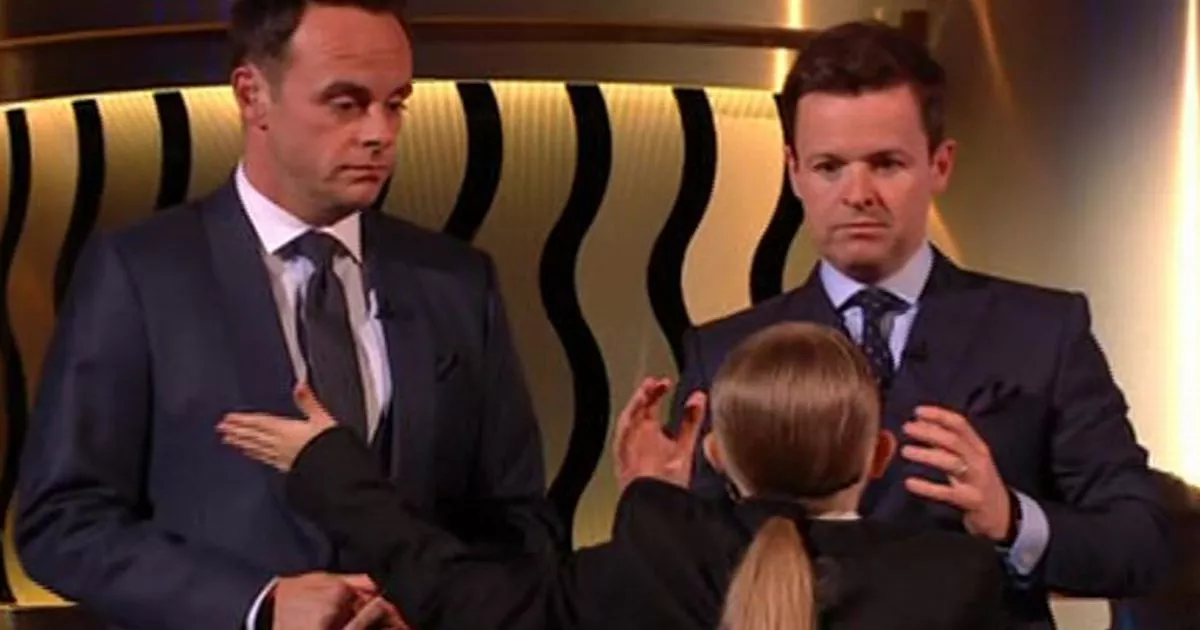Nervous Child's BGT Exit: A Live Performance Interrupted

Table of Contents
The Britain's Got Talent Incident: A Case Study
The BGT incident involved a young child who, visibly overwhelmed by anxiety, was unable to complete their performance. Observable signs included trembling, tears, and a clear inability to continue despite encouragement from the judges. The child's distress was palpable, prompting immediate concern from the audience and judges alike. This emotional display sparked a significant public discussion, with many viewers expressing empathy and raising concerns about the pressure placed on young performers in such high-stakes environments.
- Specific behaviors exhibited: The child visibly trembled, began to cry uncontrollably, and repeatedly attempted to leave the stage. Their voice cracked, and they appeared to experience a complete loss of composure.
- Reactions from judges and the audience: The judges showed immense compassion and understanding, swiftly ending the performance to ensure the child's well-being. The audience responded with a mixture of empathy and applause, offering supportive cheers.
- Media coverage and public opinion: The incident received widespread media coverage, sparking debates about the appropriateness of children participating in talent shows and the potential impact of intense pressure on young performers' mental health. Many commentators emphasized the need for greater sensitivity and support for vulnerable children in such situations.
Understanding the Psychology of Stage Fright in Children
Stage fright, or performance anxiety, in children is a common phenomenon with roots in various psychological and physiological factors. It’s crucial to differentiate between healthy nerves – a bit of excitement before a performance – and debilitating anxiety that prevents a child from functioning.
-
Fear of failure and judgment: Children may worry intensely about making mistakes or receiving negative criticism from judges, peers, or family. This fear can be magnified in high-pressure environments like televised talent shows.
-
Pressure from parents or teachers: Unrealistic expectations and excessive pressure from adults can significantly contribute to a child's anxiety. The desire to see their child succeed can inadvertently create an overwhelming burden.
-
Lack of preparation or practice: Insufficient rehearsal can increase anxiety as children feel unprepared and lack confidence in their abilities. Thorough practice builds competence and reduces uncertainty.
-
Negative past experiences: A previous negative experience on stage or in a similar performance setting can create lasting anxiety and fear of repetition.
-
Physical symptoms of anxiety: These can include a rapid heartbeat, sweating, trembling, nausea, and difficulty breathing, all of which further intensify the feeling of panic and helplessness.
-
Healthy nerves vs. debilitating anxiety: It's important to distinguish between typical pre-performance jitters and debilitating anxiety that interferes with a child's ability to function.
-
The impact of social media and amplified pressure: The ubiquitous nature of social media further magnifies pressure, with performances potentially facing widespread scrutiny and criticism.
-
The role of perfectionism: Children who strive for perfection may experience heightened anxiety, as any perceived flaw can trigger intense feelings of self-criticism and failure.
Coping Mechanisms and Support Strategies for Anxious Young Performers
Helping children overcome performance anxiety requires a multifaceted approach involving positive reinforcement, gradual exposure, relaxation techniques, and, in some cases, professional help.
-
Positive reinforcement and encouragement: Focus on effort and improvement, not solely on the outcome. Celebrate small victories and build confidence through consistent praise.
-
Gradual exposure to performance situations: Start with small, low-pressure performances, gradually increasing the challenge as the child's confidence grows. This could include performing for family, friends, or in smaller school events.
-
Relaxation techniques: Teach deep breathing exercises, mindfulness techniques, and progressive muscle relaxation to help manage physical symptoms of anxiety.
-
Professional help from therapists or counselors: For children experiencing severe anxiety, professional guidance from therapists specializing in child anxiety and performance anxiety can be invaluable. Cognitive Behavioral Therapy (CBT) is often effective in treating performance anxiety.
-
Building self-esteem and confidence: Encourage participation in activities that foster self-esteem and build confidence outside of performing, such as sports, arts, and crafts.
-
Importance of age-appropriate expectations and realistic goals: Avoid setting unrealistic expectations. Focus on effort and enjoyment, rather than solely on achieving perfection.
-
Strategies for managing pre-performance nerves: Develop a pre-performance routine that incorporates relaxation techniques and positive self-talk.
-
Resources for finding professional help: Organizations like the Anxiety & Depression Association of America offer resources and referrals to mental health professionals.
The Role of Parents and Educators
Parents and educators play a crucial role in creating a supportive and understanding environment for anxious young performers. Avoid pushing children too hard, prioritizing their well-being above achieving success.
- Specific examples of supportive language and actions: Use phrases like, "I'm proud of you for trying," or "It's okay to feel nervous; everyone does."
- Red flags to watch out for concerning a child's anxiety levels: Excessive worrying, avoidance of performance situations, physical symptoms like stomach aches or headaches, and changes in sleep patterns.
- Advice on how to communicate with the child about their anxiety: Listen empathetically, validate their feelings, and help them identify and manage their anxiety triggers.
Conclusion
The "Nervous Child's BGT Exit" incident served as a powerful reminder of the prevalence and impact of childhood performance anxiety. Understanding the underlying causes, employing effective coping mechanisms, and creating a supportive environment are crucial in helping young performers navigate the challenges of live performances. Remember, fostering a child's well-being and self-esteem should always be prioritized over pushing them towards potentially damaging levels of performance pressure. Support a nervous child and help them conquer stage fright by learning more about managing their performance anxiety and seeking professional help when needed. For further information on supporting children with anxiety, please refer to [link to relevant resource].

Featured Posts
-
 2025 Kentucky Derby A Pace Projection And Impact On Winning Strategy
May 05, 2025
2025 Kentucky Derby A Pace Projection And Impact On Winning Strategy
May 05, 2025 -
 Father Daughter Duo Bradley Cooper And Lea At Super Bowl 2025
May 05, 2025
Father Daughter Duo Bradley Cooper And Lea At Super Bowl 2025
May 05, 2025 -
 Monkey Business High Expectations For Upcoming Horror Franchise Reboot
May 05, 2025
Monkey Business High Expectations For Upcoming Horror Franchise Reboot
May 05, 2025 -
 Director Denies Another Simple Favor Set Drama Between Blake Lively And Anna Kendrick
May 05, 2025
Director Denies Another Simple Favor Set Drama Between Blake Lively And Anna Kendrick
May 05, 2025 -
 Paddy Pimblett Raises Concerns About Michael Chandler Before Ufc 314 Fight
May 05, 2025
Paddy Pimblett Raises Concerns About Michael Chandler Before Ufc 314 Fight
May 05, 2025
